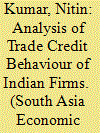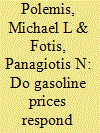|
|
|
Sort Order |
|
|
|
Items / Page
|
|
|
|
|
|
|
| Srl | Item |
| 1 |
ID:
178436


|
|
|
|
|
| Summary/Abstract |
Trade credit transactions are quite common for businesses. The article carries out the trade credit analysis for an emerging economy, namely Indian corporate sector employing rich information dataset covering multiple industries such as manufacturing, services, construction and others, since the period of financial crisis including both firm specific and macro-economic factors. The annual dataset spans 13 years from 2006 to 2018 covering the crisis period. Applying dynamic panel framework, it is found that the inventory management and macro indicators are significant in determining trade credit for Indian firms. While trade payable is chiefly driven by raw material inventory, firms having reasonable stock of raw or finished goods inventory are less likely to offer trade credit. Large-sized firms are found to be both leading consumers and suppliers of the trade credit. The pecking order theory is clearly validated with net profits being preferred over the trade credit that is a more expensive source of finance. Credit from formal financial sources is found to act as a substitute to trade credit borrowing.
|
|
|
|
|
|
|
|
|
|
|
|
|
|
|
|
| 2 |
ID:
179957


|
|
|
|
|
| Summary/Abstract |
This study investigated the causal linkages among democracy, regime durability and terrorism for a panel of 53 African countries over the period 1980-2012. Due to the count nature of terrorism data, the study employs a negative binomial regression estimator. The empirical analysis is based on four terrorism types namely: domestic, transnational, uncertain and total terrorism respectively. The following are the key findings: First, with the exception of the specification relating to uncertain terrorism, the unconditional effect of democracy was found to be negative on the other three dimensions of terrorism. Second, the unconditional impact of regime durability was also positive on terrorism with the exception of uncertain terrorism but in a rather inconsistent manner. Third, the interactions between democracy and regime durability are found to have positive marginal effects on all the terrorism types except uncertain terrorism. Fourth, the net effects of interaction between democracy and regime durability are positive across various models of these terrorism measures. Lastly, the theoretical priors of other covariates are equally validated across different measures of terrorism. On the policy arena, mitigating terrorism would require embracing democratic regime and mainstreaming the concomitant doctrines into the politico-institutional architecture but not without moderation in regime elongation.
|
|
|
|
|
|
|
|
|
|
|
|
|
|
|
|
| 3 |
ID:
121298


|
|
|
|
|
| Publication |
2013.
|
| Summary/Abstract |
This paper uses the generalized method of moments (GMM) estimation to a panel data error correction model (ECM) in order to measure the asymmetries in the transmission of shocks to input prices and exchange rate onto the wholesale and retail gasoline price, respectively. For this purpose, we use an updated data set of 6369 weekly observations (January 2000 to February 2011) for 11 euro zone countries. The results indicate the existence of asymmetric responses in the retail and wholesale segment due to possible reasons (oligopolistic structure of the refining industry, existence of consumers search costs, regulatory and legal barriers).
|
|
|
|
|
|
|
|
|
|
|
|
|
|
|
|
| 4 |
ID:
178843


|
|
|
|
|
| Summary/Abstract |
Generally, public spending on education, research, and development (R&D) is perceived to impact the economy and sustainability positively; however, such notion lacks evidence, particularly in Belt and Road Initiative (BRI) member countries. In this study, panel data of BRI member countries from 2008 to 2018 is analysed using the generalized method of moments (GMM) method and data envelopement analysis (DEA) to assess the relationship between public spending on R&D and green economic growth and energy efficiency. The study found a fluctuating green economic growth indicator during the research period attributed to the non-serious nature of government policies. The findings reveal that the GMM method confirms both composition and technique effects in the entire sample. Nonetheless, the result of the sub-sample showed a heterogeneous effect on high GDP per capita countries. Moreover, the study shows that public spending on human resources and R&D of green energy technologies prompts a sustainable green economy through labour and technology-oriented production activities and different effects in different countries.
|
|
|
|
|
|
|
|
|
|
|
|
|
|
|
|
|
|
|
|
|